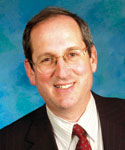 Learning From Experts
Learning From Experts
One of the questions I am most frequently asked by alumni these days, given the challenges facing our legal profession, is “What are the students in the first-year class like?” The answer is: nothing short of extraordinary! By all measures, they are the brightest, smartest, and most well-rounded class this school has ever seen. My faculty colleagues and I find them to be energetic and quick learners, and they have already brought that spark of learning into the classroom in so many ways. I know in my criminal law course I can see these young minds deeply engaged with the concepts that are laid before them. This is what we are about here at GW Law School.
As I have said before, a vital part of why and how this school works so well is our location. Students come to law school in Washington, D.C., to tap the vibrancy of the legal landscape and to hear from the individuals who are at the forefront of the issues of the day. This fall, the Law School has had a number of opportunities to hear firsthand from those individuals who are shaping the ongoing discussion on a number of issues important not only to legal practitioners but also to the nation.
In just two weeks in October, the Law School had the honor to host and participate in several events. First, on Oct. 15, as part of a two-day Law Review Symposium, Supreme Court Justice Anthony M. Kennedy gave the keynote address and offered his unique perspective on the history, dynamics, and importance of judicial review. Justice Kennedy stressed that the Constitution belongs to the people and is the thread that binds our nation. Our students and faculty members were riveted by the depth of his remarks and his level of engagement with the audience. It was a rare opportunity to learn from someone who has had a part in shaping the law for more than two decades.
Next, on Oct. 21, Secretary of Homeland Security Janet Napolitano gave an address at the Law School sponsored by our new National Security Law LL.M. Program and the law firm Dickstein Shapiro. Secretary Napolitano explained the new course she has set for her department to a packed crowd of students and faculty members. With anti-terrorism as the main focus, she stressed the critical need to balance the rule of law with the obligation to keep America safe. The students enjoyed the opportunity to engage with such a major policymaker during a time in history when we are wrestling with many legal, ethical, and moral issues related to the threats posed by terrorism.
Finally, on Oct. 23, the Financial Regulatory Reform Symposium was held on campus, where leading experts offered their views on how to reform our financial system. Students heard keynote and luncheon addresses from Gary Gensler, chairman of the Commodity Futures Trading Commission, and a presentation that caught the attention of many in the media from Kenneth Feinberg, special master for TARP executive compensation in the Department of the Treasury. Mr. Feinberg discussed the regulation of CEO pay at firms receiving government aid and recent pay cuts announced for executives at seven large financial companies. His remarks received national attention, and our students benefited from a personal look at the thought processes and methodology employed to develop policies to address government oversight and financial regulation today.
These events underscore our commitment to being a national law school in a city where law and policy meet and become transformed as one. We are all proud to be part of a Law School community that is imaginative, innovative, and bold enough to schedule and provide a venue for these events. Please read more about them in this edition of GW Law School magazine.
Many of you were present in October for our annual Alumni Weekend, our best attended reunion ever. That weekend the Law School Board of Advisors held its fall meeting, focusing on the challenges posed by the changing legal profession. I gave a number of presentations on the state of the Law School, and a panel composed of board members Corinne Ball, JD ’78; Bobby Burchfield, JD ’79; William Shawn, JD ’73; and Robert Tanenbaum, JD ’82, shared their views of the future of the legal profession. Additionally, Professor Tom Morgan gave us a preview of his new book, The Vanishing Lawyer: The Ongoing Transformation of the U.S. Legal Profession. All of these discussions contributed in a major way to our ongoing consideration of the impact of the dynamic and evolving legal profession on legal education. Moreover, the input of our committed alumni leadership will influence our creative thinking in a number of extracurricular areas, including career placement and development. The value of the energy and insight they provide, plus their considerable financial support, cannot be overstated. In the coming months, you will see the benefits of this weekend, especially in the area of career placement.
I look forward to hearing from you on these serious issues facing legal education. I particularly look forward to continuing this conversation in person at alumni events around the country in the coming months. Thank you for your support.
Frederick M. Lawrence
Dean and Robert Kramer Research
Professor of Law
